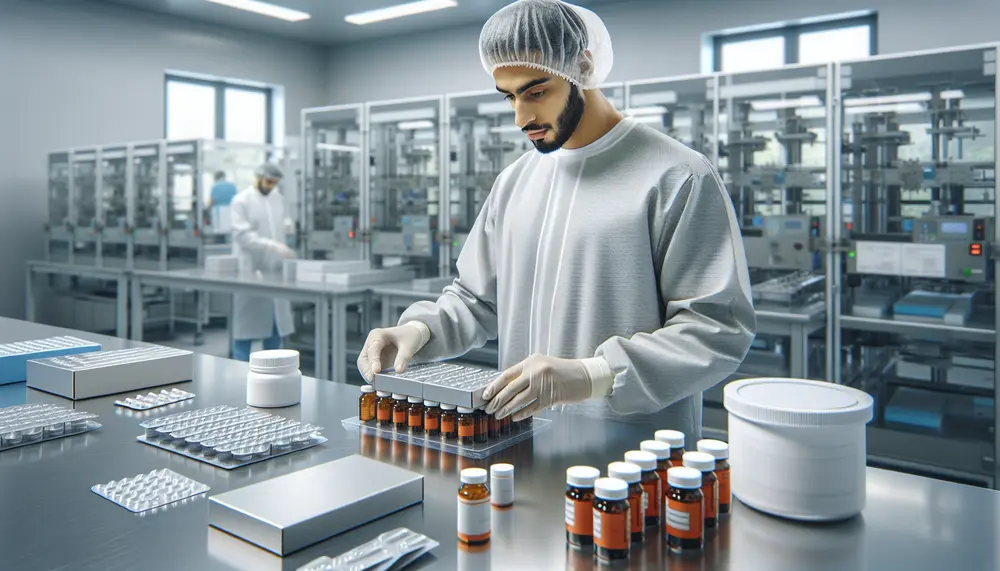Table of Contents:
Introduction to Pharmaceutical Packaging Technician
The role of a pharmaceutical packaging technician is crucial in the pharmaceutical industry. These professionals ensure that medicines and other healthcare products are packaged correctly and safely. This guarantees that the products maintain their quality and effectiveness until they reach the consumer.
A pharmaceutical packaging technician works in various settings, including manufacturing plants, laboratories, and distribution centers. They handle different types of packaging materials such as blister packs, bottles, and tubes. The main goal is to protect the contents from contamination, damage, and degradation.
Understanding this role is essential for anyone interested in pursuing a career in the pharmaceutical field. It involves a mix of technical skills, attention to detail, and adherence to strict industry standards. In the following sections, we will explore the core responsibilities and necessary skills for this vital position.
Core Responsibilities of a Pharmaceutical Packaging Technician
A pharmaceutical packaging technician has a variety of tasks that ensure the safe and efficient packaging of pharmaceutical products. These responsibilities are essential to maintain the integrity and quality of the products. Below are some of the core duties:
Preparing Packaging Materials
Technicians must prepare and inspect packaging materials before use. This includes checking for any defects or damages that could compromise the product's safety.
Operating Packaging Machinery
They operate various types of packaging machinery, such as filling machines, sealing machines, and labeling equipment. Proper operation ensures that products are packaged correctly and efficiently.
Quality Control
Ensuring that each package meets quality standards is a critical part of their job. Technicians perform regular checks to verify that the packaging process adheres to industry regulations.
Documentation and Record-Keeping
Maintaining accurate records is vital. Technicians document every step of the packaging process, including batch numbers, quantities, and any issues encountered during production.
Troubleshooting and Maintenance
If any issues arise with the packaging machinery, technicians must troubleshoot and perform basic maintenance to resolve problems quickly. This minimizes downtime and maintains production efficiency.
- Inspecting materials
- Operating machinery
- Ensuring quality control
- Maintaining records
- Troubleshooting issues
The role requires a high level of precision and attention to detail to ensure the safety and effectiveness of pharmaceutical products.
Pharmaceutical Packaging Technician: Pros and Cons
| Pros | Cons |
|---|---|
| Opportunity to work in a fast-growing industry | Exposure to hazardous materials and chemicals |
| Job stability and security | Repetitive tasks can be monotonous |
| Potential for advancement and career growth | Strict regulations and standards to follow |
| Contributing to public health and safety | Physical demands can be high |
| Variety of tasks and responsibilities | Long hours and shift work |
Essential Skills for a Pharmaceutical Packaging Technician
Being a pharmaceutical packaging technician requires a unique set of skills. These skills ensure that the packaging process runs smoothly and efficiently. Below are some of the essential skills needed for this role:
Technical Proficiency
Technicians must be adept at operating and maintaining packaging machinery. This includes understanding the mechanics of various machines and being able to troubleshoot issues as they arise.
Attention to Detail
A high level of attention to detail is crucial. Technicians need to ensure that all packaging meets strict quality standards and that any defects or inconsistencies are quickly identified and addressed.
Manual Dexterity
This role often involves handling small components and delicate materials. Good hand-eye coordination and manual dexterity are essential for performing these tasks accurately.
Problem-Solving Skills
Technicians must be able to think on their feet and solve problems quickly. Whether it's a mechanical issue with the machinery or an inconsistency in the packaging, quick problem-solving is key to minimizing downtime.
Communication Skills
Effective communication is important for coordinating with other team members and ensuring that any issues are promptly reported and resolved. Clear documentation also falls under this skill set.
- Technical proficiency
- Attention to detail
- Manual dexterity
- Problem-solving skills
- Communication skills
The combination of these skills ensures that pharmaceutical packaging technicians can perform their duties effectively, maintaining high standards of safety and quality.
The Importance of Accuracy and Attention to Detail
In the pharmaceutical industry, accuracy and attention to detail are paramount. These attributes ensure that products are safe for consumption and meet regulatory standards. A small mistake can lead to serious consequences, making precision a top priority.
Ensuring Product Safety
Every step in the packaging process must be executed with care. This includes verifying the correct dosage, labeling, and sealing of products. Any error can compromise product safety and efficacy.
Maintaining Regulatory Compliance
The pharmaceutical sector is heavily regulated. Packaging technicians must adhere to guidelines set by bodies like the FDA or EMA. Accurate work ensures compliance with these regulations, avoiding legal issues and recalls.
Preventing Contamination
Attention to detail helps prevent contamination. Technicians must ensure that packaging materials are clean and free from defects. Proper sealing techniques are also crucial to maintain product integrity.
"Precision in packaging is not just a skill; it's a responsibility." – Industry Expert
Reducing Waste and Costs
Mistakes in packaging can lead to wasted materials and increased costs. By being meticulous, technicians help reduce waste, contributing to more efficient production processes.
- Ensuring product safety
- Maintaining regulatory compliance
- Preventing contamination
- Reducing waste and costs
The role of accuracy and attention to detail cannot be overstated in pharmaceutical packaging. These qualities ensure that products are safe, effective, and compliant with industry standards.
Compliance with Industry Standards and Regulations
For a pharmaceutical packaging technician, adhering to industry standards and regulations is non-negotiable. Compliance ensures that products are safe, effective, and legally marketable. Understanding and following these guidelines is a critical part of the job.
Understanding Regulatory Bodies
Various organizations set the standards for pharmaceutical packaging. In the United States, the Food and Drug Administration (FDA) oversees these regulations. In Europe, it’s the European Medicines Agency (EMA). Technicians must be familiar with the guidelines from these bodies.
Good Manufacturing Practices (GMP)
One key set of standards is Good Manufacturing Practices (GMP). These practices cover every aspect of production, from raw materials to finished products. GMP ensures that products are consistently produced and controlled according to quality standards.
Standard Operating Procedures (SOPs)
Companies often have their own Standard Operating Procedures (SOPs). These documents provide detailed instructions on how to perform tasks correctly. Following SOPs helps maintain consistency and compliance with regulatory requirements.
"Adhering to GMP and SOPs is essential for ensuring product quality and safety." – Quality Assurance Specialist
Regular Audits and Inspections
Regulatory bodies conduct regular audits and inspections. These ensure that companies comply with industry standards. Packaging technicians must be prepared for these inspections by maintaining accurate records and adhering to protocols.
- Understanding regulatory bodies
- Following GMP guidelines
- Adhering to SOPs
- Preparing for audits
Compliance with industry standards and regulations is crucial for any pharmaceutical packaging technician. It ensures that products are safe, high-quality, and meet all legal requirements.
Training and Certifications for Pharmaceutical Packaging Technicians
Proper training and certifications are essential for a pharmaceutical packaging technician. They ensure that technicians have the knowledge and skills needed to perform their duties effectively. Here, we will explore the types of training and certifications available.
On-the-Job Training
Many technicians start with on-the-job training. This hands-on experience helps them understand the specific processes and machinery used in their workplace. Experienced colleagues often mentor new technicians during this phase.
Formal Education Programs
Some technicians pursue formal education programs. These can include certificates or associate degrees in fields like pharmaceutical technology or industrial engineering. Such programs provide a solid foundation in the technical aspects of packaging.
Certifications
Various certifications can enhance a technician's qualifications. These certifications demonstrate proficiency and commitment to industry standards:
- Certified Pharmaceutical Technician (CPhT): Offered by organizations like the Pharmacy Technician Certification Board (PTCB), this certification covers a broad range of pharmaceutical knowledge.
- Good Manufacturing Practice (GMP) Certification: This certification focuses on understanding and implementing GMP standards, which are crucial for maintaining quality and compliance.
- Hazard Analysis Critical Control Point (HACCP) Certification: This certification is important for understanding risk management and ensuring product safety.
"Certifications validate a technician's expertise and adherence to industry standards." – Training Specialist
Continuing Education
The pharmaceutical industry is constantly evolving. Technicians must engage in continuing education to stay current with new technologies, regulations, and best practices. Workshops, seminars, and online courses are common methods for ongoing learning.
- On-the-job training
- Formal education programs
- Industry certifications
- Continuing education
Training and certifications are vital for a pharmaceutical packaging technician. They ensure that technicians have the necessary skills to maintain high standards of safety, quality, and compliance in their work.
Career Opportunities and Job Market Overview
The field of pharmaceutical packaging technicians offers numerous career opportunities. The demand for these professionals is growing due to the increasing need for safe and effective pharmaceutical products. Here, we will explore the job market and potential career paths.
Growing Demand in the Industry
The pharmaceutical industry is expanding, driven by advancements in medicine and an aging population. This growth translates to a higher demand for skilled packaging technicians. Companies need professionals who can ensure product safety and compliance with regulations.
Types of Employers
Pharmaceutical packaging technicians can find employment in various settings:
- Pharmaceutical Manufacturing Plants: These facilities require technicians to manage large-scale packaging operations.
- Research and Development Laboratories: Technicians may work on packaging prototypes for new drugs.
- Contract Packaging Organizations (CPOs): These companies offer packaging services to multiple pharmaceutical firms.
- Distribution Centers: Ensuring products are packaged correctly before shipping to pharmacies or hospitals.
Job Market Overview
The job market for pharmaceutical packaging technicians is robust. Positions are available worldwide, with varying requirements based on location and employer:
| Position | Location | Salary Range | Description |
|---|---|---|---|
| Production Technician at Medisca Inc. | Plattsburgh, NY, USA | $20.79 per hour | Full-time role involving preparation and inspection of packaging materials. |
| Manufacturing Technician – Night Shift at Jubilant HollisterStier Spokane | Spokane, WA, USA | N/A | Requires experience in chemical mixing and pharmaceutical production; night shift position. |
| Packaging Technician at Gi Group | Worthing, UK | N/A | Follows pharmaceutical guidelines; maintains documentation accurately. |
Career Advancement Opportunities
A career as a pharmaceutical packaging technician can lead to advanced roles such as:
- Packaging Supervisor or Manager: Overseeing a team of technicians and ensuring efficient operations.
- Quality Assurance Specialist: Focusing on maintaining high standards of quality throughout the packaging process.
- Regulatory Affairs Specialist: Ensuring compliance with industry standards and regulations on a broader scale.
- Technical Trainer or Instructor: Educating new technicians and providing ongoing training for current employees.
“The pharmaceutical packaging field offers diverse opportunities for growth and specialization.”– Career Counselor
The job market for pharmaceutical packaging technicians is promising. With proper training and experience, these professionals can enjoy a rewarding career with plenty of advancement opportunities.
Conclusion: The Vital Role of Pharmaceutical Packaging Technicians
The role of a pharmaceutical packaging technician is indispensable in the pharmaceutical industry. These professionals ensure that medicines and healthcare products are packaged safely and effectively, maintaining their quality until they reach the consumer.
Key Takeaways
- Critical Responsibilities: From preparing materials to operating machinery, their tasks are crucial for product safety and compliance.
- Essential Skills: Technical proficiency, attention to detail, and problem-solving abilities are vital for success in this role.
- Regulatory Compliance: Adherence to industry standards and regulations ensures product safety and legal compliance.
- Training and Certifications: Proper education and certifications enhance a technician's skills and career prospects.
- Career Opportunities: The growing pharmaceutical industry offers numerous job opportunities and potential for advancement.
The Impact on Public Health
Pharmaceutical packaging technicians play a direct role in safeguarding public health. By ensuring that medicines are packaged correctly, they help prevent contamination, dosage errors, and other issues that could compromise patient safety. Their work is fundamental to the trust consumers place in pharmaceutical products.
“Pharmaceutical packaging technicians are the unsung heroes ensuring the safety and efficacy of our medicines.”– Industry Expert
A Rewarding Career Path
This profession offers a rewarding career path for those with a keen eye for detail and a commitment to quality. With continuous advancements in the pharmaceutical field, there will always be a need for skilled packaging technicians who can adapt to new technologies and regulations.
In summary, the role of pharmaceutical packaging technicians is vital. They ensure that products not only meet regulatory standards but also reach consumers in perfect condition. Their contributions are essential to the overall success of the pharmaceutical industry.
FAQs on Pharmaceutical Packaging Technicians
What are the main responsibilities of a pharmaceutical packaging technician?
A pharmaceutical packaging technician prepares packaging materials, operates packaging machinery, ensures quality control, maintains accurate records, and troubleshoots machinery issues to ensure the safe and efficient packaging of pharmaceutical products.
What skills are essential for a pharmaceutical packaging technician?
Key skills include technical proficiency, attention to detail, manual dexterity, problem-solving skills, and effective communication. These ensure that packaging processes run smoothly and meet industry standards.
Why is attention to detail important for pharmaceutical packaging technicians?
Attention to detail is crucial to ensure product safety, maintain regulatory compliance, prevent contamination, and reduce waste. Even small mistakes can lead to severe consequences in the pharmaceutical industry.
What certifications can enhance a pharmaceutical packaging technician’s career?
Certifications such as Certified Pharmaceutical Technician (CPhT), Good Manufacturing Practice (GMP) Certification, and Hazard Analysis Critical Control Point (HACCP) Certification can enhance a technician's qualifications and career prospects.
What are the career advancement opportunities for pharmaceutical packaging technicians?
Career advancement opportunities include roles such as Packaging Supervisor or Manager, Quality Assurance Specialist, Regulatory Affairs Specialist, and Technical Trainer or Instructor.






